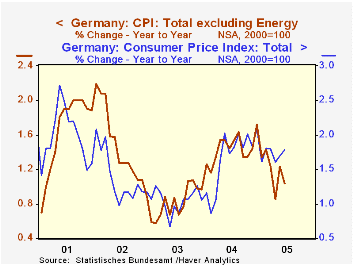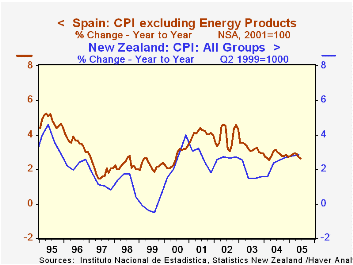 Global| Jul 14 2005
Global| Jul 14 2005Several Nations' CPI's Remain Moderate Despite Rapidly Rising Energy Costs
Summary
Several countries reported June CPI today, and the results generally suggest that overall inflation remains quiescent. Prices in both Germany and Italy were flat after a 0.3% rise in May, and year-on-year rates four of the six [...]

Several countries reported June CPI today, and the results generally suggest that overall inflation remains quiescent. Prices in both Germany and Italy were flat after a 0.3% rise in May, and year-on-year rates four of the six reporting countries, which also include Spain, Finland, New Zealand and the US, remain at or below their pace during 2004.
Inflation is always of interest, but all the more presently because of the surge in energy prices. So we keep checking to see if there has been an acceleration in overall inflation or, if available, in the overall rate excluding energy. This latter is important for showing whether higher energy costs are being pushed through to the prices of other goods and services. In the three countries for which a total excluding energy is published, Germany, Spain and the US, this year/year rate was lower in June than it had been six months ago.
In this same time-period comparison, the 12-month percent change in June versus that for December 2004, we can discern differing trends in non-energy sectors that might help us understand how this moderate inflation is being sustained. Clothing prices are weak in almost every country, and in the places where they are not slowing, they are moving evenly with 2004's pace. Communications prices continue to decline outright, though less rapidly in some countries. Health care costs -- at least the portion covered here, the part consumers actually pay -- are generally rising at about the same rate. Food and household goods prices are mixed among the various reporting countries. Thus, apart from the clothing sector, where weakness is widespread, there is no systematic pattern of price change among the categories and the countries. This randomness is probably beneficial to the prevention of a general acceleration of prices, since it indicates considerable resistance to higher prices in disparate places in the world.
| % Changes Yr/Yr calculated from NSA |
June 2005 | May 2005 | Year/ Year | December/December|||
|---|---|---|---|---|---|---|
| 2004 | 2003 | 2002 | ||||
| Germany (SA) | 0.0 | 0.3 | 1.8 | 3.3 | 1.9 | 2.4 |
| ex Energy (SA) | -0.2 | 0.4 | 1.0 | 1.7 | 1.0 | 0.9 |
| Spain (NSA) | 0.3 | 0.2 | 3.2 | 3.2 | 2.6 | 4.5 |
| ex Energy (NSA) | 0.1 | 0.3 | 2.6 | 2.7 | 2.9 | 4.3 |
| Italy (NSA) | 0.0 | 0.3 | 1.8 | 2.0 | 2.5 | 2.8 |
| Finland (NSA) | 0.3 | -0.3 | 1.1 | 0.4 | 0.6 | 1.7 |
| New Zealand (NSA) | 0.9* | 2.8 | 2.7 | 1.6 | 2.7 | |
| Memo: US (SA) | 0.0 | -0.1 | 2.5 | 3.3 | 1.9 | 2.4 |
| ex Energy (SA) | 0.1 | 0.2 | 2.1 | 2.2 | 1.5 | 1.8 |
Carol Stone, CBE
AuthorMore in Author Profile »Carol Stone, CBE came to Haver Analytics in 2003 following more than 35 years as a financial market economist at major Wall Street financial institutions, most especially Merrill Lynch and Nomura Securities. She had broad experience in analysis and forecasting of flow-of-funds accounts, the federal budget and Federal Reserve operations. At Nomura Securities, among other duties, she developed various indicator forecasting tools and edited a daily global publication produced in London and New York for readers in Tokyo. At Haver Analytics, Carol was a member of the Research Department, aiding database managers with research and documentation efforts, as well as posting commentary on select economic reports. In addition, she conducted Ways-of-the-World, a blog on economic issues for an Episcopal-Church-affiliated website, The Geranium Farm. During her career, Carol served as an officer of the Money Marketeers and the Downtown Economists Club. She had a PhD from NYU's Stern School of Business. She lived in Brooklyn, New York, and had a weekend home on Long Island.
More Economy in Brief
 Global| Feb 05 2026
Global| Feb 05 2026Charts of the Week: Balanced Policy, Resilient Data and AI Narratives
by:Andrew Cates





